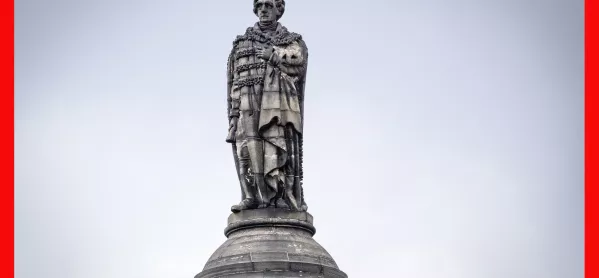5 ways to improve schools’ teaching about colonialism

As an undergraduate history student writing my dissertation on the British Empire, I have been reflecting about the ways in which I was taught about colonialism in secondary school in the fairly recent past - I left school in 2018.
I was fortunate enough to have had a teacher who felt it was important to teach his students every aspect of Scotland’s history, even when that history did not reflect well on Scotland. However, many of my peers reported they had never covered imperialism in the classroom, and their first exposure to colonial history was at a university level.
By teaching students about Scotland’s colonial past, it is possible for us all to understand the Scotland we live in today. Scottish education itself has a history rooted in colonialism: Scottish Protestant missionaries set up schools throughout British Africa in the 19th and 20th centuries, and the Scottish education system was emulated throughout the British Empire (see reference below).
Colonialism can be an intimidating topic to broach in a way that is informative and sensitive. Schools throughout Scotland study the “Migration and Empire” pathway as part of the history curriculum, starting vital conversations about Scotland’s relationship with the rest of the world. But how can teachers facilitate helpful and much-needed discussions of the imperial past?
1. Make the classroom a safe space
Have students reflect on their own “positionality” - why who they are and where they’re from might impact how they interact with certain histories. Not only should students think about their own positions in these histories but the circumstances of those around them; urge students to interact with course content thoughtfully.
Education secretary: Teach colonial past to tackle racism, says Somerville
History: 3 ways we can improve teaching about the slave trade
Quick read: How we can decolonise geography in schools
Podcast: ‘Use the school curriculum to tackle racism’
2. Use correct terminology
One practical way to help create a safe space is by giving students the language needed to articulate their points. For example, students should be taught not to refer to groups of people using outdated colonial language such as “tribe” and “native”. Rather than making sweeping statements and broad generalisations, students should take care to describe groups of people by their specific nationality or ethnic group.
3. Centre cultural sensitivity
By learning to address groups by their proper names, it becomes easier to avoid racist stereotypes, and discuss the colonial past in a nuanced and respectful way. Teachers should work to actively deconstruct stereotypes and urge students to be critical of contemporary sources rooted in racist ideologies.
When teaching about colonialism, there is a difficult balance to strike between showing the honest and upsetting reality and taking student wellbeing into account. It can be distressing for black and minority ethnic students to be exposed to graphic imagery depicting colonial atrocities. It would help students if teachers carefully considered the imagery they selected when covering these topics, and provided content warnings so that students can be prepared for the lesson ahead.
4. Focus on agency
Although the Migration and Empire topic falls within the Scottish section of the National 5 and Higher history courses, it is rarely useful to study any kind of history from just one perspective. In line with calls to “decolonise the curriculum”, the course specifications mandate that teachers cover the reaction of indigenous peoples to Scottish settlement throughout the Empire. This focus on indigenous agency can help to re-centre the conversation and avoid glorifying imperial exploitation.
5. Link back to the present day
History is not confined to the pages of textbooks; it’s happening all around us as a continuous process. Encourage students to do their own research into how migration and empire has shaped their family histories. Armed with the context of the past, students can hopefully better understand the world around them, why it’s structured the way it is - and how they can help to make it a better place for everyone.
Robyn Barclay is an undergraduate history student specialising in colonialism, based in Scotland. She tweets @robyn_barclay_
Reference:
Markku Hokkanen, ’“Christ and the Imperial Games Fields” in South-Central Africa - Sport and the Scottish Missionaries in Malawi, 1880-1914: Utilitarian Compromise’, The International Journal of the History of Sport 22 (2005).
You need a Tes subscription to read this article
Subscribe now to read this article and get other subscriber-only content:
- Unlimited access to all Tes magazine content
- Exclusive subscriber-only stories
- Award-winning email newsletters
Already a subscriber? Log in
You need a subscription to read this article
Subscribe now to read this article and get other subscriber-only content, including:
- Unlimited access to all Tes magazine content
- Exclusive subscriber-only stories
- Award-winning email newsletters